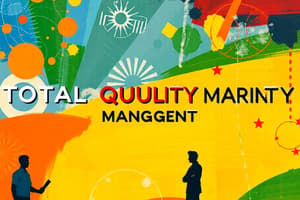Podcast
Questions and Answers
What is the primary focus of Employee Empowerment?
What is the primary focus of Employee Empowerment?
Which leadership style is most effective during times of change?
Which leadership style is most effective during times of change?
What is a key characteristic of effective communication?
What is a key characteristic of effective communication?
Which strategy is essential for overcoming negativity in the workplace?
Which strategy is essential for overcoming negativity in the workplace?
Signup and view all the answers
How does team building contribute to organizational effectiveness?
How does team building contribute to organizational effectiveness?
Signup and view all the answers
What is a fundamental principle of Total Quality Management (TQM)?
What is a fundamental principle of Total Quality Management (TQM)?
Signup and view all the answers
Which of the following concepts is NOT associated with Just-in-Time (JIT) manufacturing?
Which of the following concepts is NOT associated with Just-in-Time (JIT) manufacturing?
Signup and view all the answers
What is the primary goal of benchmarking?
What is the primary goal of benchmarking?
Signup and view all the answers
What is the primary goal of the total quality approach to quality management?
What is the primary goal of the total quality approach to quality management?
Signup and view all the answers
How does quality impact global competitiveness?
How does quality impact global competitiveness?
Signup and view all the answers
Which of the following aligns with the principles of ethical quality management?
Which of the following aligns with the principles of ethical quality management?
Signup and view all the answers
What does a strong quality culture involve?
What does a strong quality culture involve?
Signup and view all the answers
In the context of strategic management, what is essential for gaining competitive advantage?
In the context of strategic management, what is essential for gaining competitive advantage?
Signup and view all the answers
What role does customer satisfaction play in organizational success?
What role does customer satisfaction play in organizational success?
Signup and view all the answers
Which approach is most likely to foster successful strategic alliances?
Which approach is most likely to foster successful strategic alliances?
Signup and view all the answers
Which aspect is critical for retaining customer loyalty?
Which aspect is critical for retaining customer loyalty?
Signup and view all the answers
What are the three types of people described in the context of quality management?
What are the three types of people described in the context of quality management?
Signup and view all the answers
What is a significant factor influencing consumer perceptions of quality in the marketplace?
What is a significant factor influencing consumer perceptions of quality in the marketplace?
Signup and view all the answers
How is quality typically judged in a restaurant setting according to the provided information?
How is quality typically judged in a restaurant setting according to the provided information?
Signup and view all the answers
When did the total quality concept gain widespread acceptance in the United States?
When did the total quality concept gain widespread acceptance in the United States?
Signup and view all the answers
Which of the following is NOT one of the criteria typically applied by consumers when assessing quality?
Which of the following is NOT one of the criteria typically applied by consumers when assessing quality?
Signup and view all the answers
Which aspect is NOT generally associated with the keys to total quality success?
Which aspect is NOT generally associated with the keys to total quality success?
Signup and view all the answers
What does the concept of 'perceived quality' imply?
What does the concept of 'perceived quality' imply?
Signup and view all the answers
What is implied to be a component of quality management moving into the twenty-first century?
What is implied to be a component of quality management moving into the twenty-first century?
Signup and view all the answers
Flashcards
Employee Empowerment
Employee Empowerment
Giving employees the authority to take ownership of their work, make decisions and solve problems, and contribute to the organization's success.
Leadership and Change
Leadership and Change
The ability to guide and motivate individuals and teams through periods of transformation and adaptation to achieve organizational goals.
Team Building
Team Building
The process of creating a cohesive group of individuals with shared goals, effective communication, and mutual trust to improve performance.
Effective Communication
Effective Communication
Signup and view all the flashcards
Education and Training
Education and Training
Signup and view all the flashcards
ISO 9000
ISO 9000
Signup and view all the flashcards
Total Quality
Total Quality
Signup and view all the flashcards
Problem Solving
Problem Solving
Signup and view all the flashcards
Quality Management
Quality Management
Signup and view all the flashcards
Total Quality Approach
Total Quality Approach
Signup and view all the flashcards
Two Views of Quality
Two Views of Quality
Signup and view all the flashcards
Key Elements of Total Quality
Key Elements of Total Quality
Signup and view all the flashcards
Total Quality Pioneers
Total Quality Pioneers
Signup and view all the flashcards
Keys to Total Quality Success
Keys to Total Quality Success
Signup and view all the flashcards
The Future of Quality Management
The Future of Quality Management
Signup and view all the flashcards
Quality Certifications
Quality Certifications
Signup and view all the flashcards
Total Quality Management (TQM)
Total Quality Management (TQM)
Signup and view all the flashcards
Quality and Global Competitiveness
Quality and Global Competitiveness
Signup and view all the flashcards
Quality Management, Ethics, and Corporate Social Responsibility
Quality Management, Ethics, and Corporate Social Responsibility
Signup and view all the flashcards
Quality Culture
Quality Culture
Signup and view all the flashcards
Strategic Management
Strategic Management
Signup and view all the flashcards
Partnering and Strategic Alliances
Partnering and Strategic Alliances
Signup and view all the flashcards
Customer Satisfaction, Retention, and Loyalty
Customer Satisfaction, Retention, and Loyalty
Signup and view all the flashcards
Study Notes
Book: Quality Management for Organizational Excellence
- Author: David L. Goetsch/Stanley Davis
- Edition: Seventh
- Publisher: Pearson Education Limited
- Year: 2014
- ISBN: 1-292-02233-7 (10) / 978-1-292-02233-8 (13)
Table of Contents
- Chapter 1: The Total Quality Approach to Quality Management: Achieving Organizational Excellence
- Chapter 2: Quality and Global Competitiveness
- Chapter 3: Quality Management, Ethics, and Corporate Social Responsibility
- Chapter 4: Quality Culture: Changing Hearts, Minds, and Attitudes
- Chapter 5: Strategic Management: Planning and Execution for Competitive Advantage
- Chapter 6: Partnering and Strategic Alliances
- Chapter 7: Customer Satisfaction, Retention, and Loyalty
- Chapter 8: Employee Empowerment
- Chapter 9: Leadership and Change
- Chapter 10: Team Building and Teamwork
- Chapter 11: Effective Communication
- Chapter 12: Education and Training
- Chapter 13: Overcoming Politics, Negativity, and Conflict in the Workplace
- Chapter 14: ISO 9000 and Total Quality: The Relationship
- Chapter 15: Overview of Total Quality Tools
- Chapter 16: Problem Solving and Decision Making
- Chapter 17: Quality Function Deployment
- Chapter 18: Optimizing and Controlling Processes through Statistical Process Control
- Chapter 19: Continual Improvement Methods with Six Sigma, Lean, Lean Six Sigma, and More
- Chapter 20: Benchmarking
- Chapter 21: Just-in-Time/Lean Manufacturing (JIT/Lean)
- Chapter 22: Implementing Total Quality Management
- Additional Sections/Appendices: Index
Studying That Suits You
Use AI to generate personalized quizzes and flashcards to suit your learning preferences.
Related Documents
Description
Test your knowledge on the key concepts from 'Quality Management for Organizational Excellence' by Goetsch and Davis. This quiz covers essential topics such as total quality management, strategic planning, and ethical considerations in quality management. Whether you're a student or a professional, this quiz will help reinforce your understanding of quality management principles.




